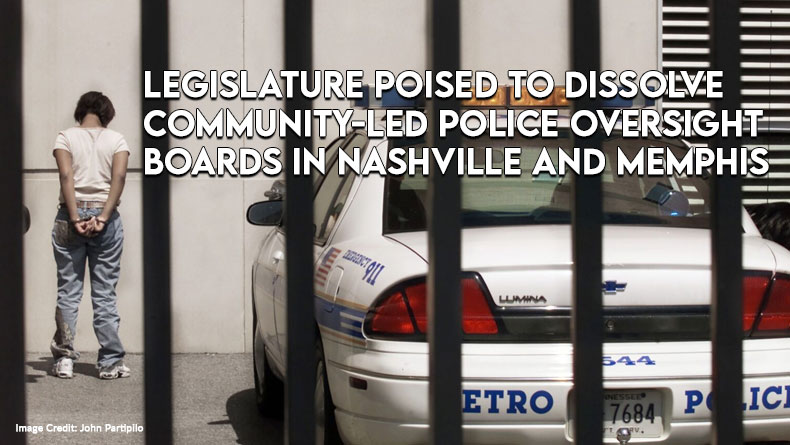Image Credit: John Partipilo
By Anita Wadhwani [Tennessee Lookout -CC BY-NC-ND 4.0] –
The Tennessee Legislature could soon eliminate community-led police oversight boards and replace them with advisory groups with little power to investigate citizen complaints.
If enacted, HB0764/SB0591 would dissolve existing boards in Nashville and Memphis within 90 days.
In their place would be seven-member “police advisory and review committees” whose members would be selected solely by a city’s mayor—instead of community groups.
The committees would lack investigatory powers: they would be required to turn over citizen complaints about officer misconduct to police internal affairs divisions within three days of receipt. The review committees would exist only in cities that opt to establish them.

Only Memphis and Nashville currently have community-led police oversight boards that would be subject to dissolution. Knoxville’s Police Advisory & Review Committee, which similarly lacks investigative authority over citizen complaints, was the model for the proposed statewide legislation, said Rep. Elaine Davis, a Knoxville Republican who is sponsoring the bill.
Davis, speaking Tuesday in the House Criminal Justice Subcommittee hearing, said the legislation would create statewide standards for police review committees.
The purpose of the committees, Davis said, would be “to strengthen the relationship between the citizens and law enforcement agencies, to ensure a timely fair and objective review of citizen complaints while protecting the individual rights of individual law enforcement officers.”
Should the bill become law, it would be “a sad day for accountability in Tennessee,” Jill Fitcheard, executive director of Nashville’s Community Oversight Board, told lawmakers during the hearing.
“Many Tennesseans, especially those in Memphis, are still reeling in despair and are traumatized by the brutal killing of Tyre Nichols at the hands of the Memphis police department,” she said.
“Knoxville and Nashville have not been exempt from similar types of police brutality, and if left without a separate entity with the authority to independently investigate these instances of police misconduct, the police will continue to police themselves, which only builds suspicion and distrust of law enforcement,” she said. “Policing in a community where people don’t trust you makes that job even more challenging and dangerous.”
Nashville’s Community Oversight Board was established in 2018 by a majority vote of the city’s residents. It currently has 11 members: seven nominated by community members, two by councilmembers and one by the Mayor. All members are approved by the Metro Council.
Nashville’s COB has the power to investigate allegations of misconduct against individual officers, recommend disciplinary measures to the Metro Nashville Police Department and refer reports of misconduct to the District Attorney, a Grand Jury or the U.S. Attorney.
Memphis’ 12-member Civilian Law Enforcement Review Board, established in 1994, similarly has the power to independently investigate citizens’ allegations of police misconduct, hear cases, make findings and recommend actions to the Memphis Police Department.
At Tuesday’s hearing, Fitchheard noted that lawmakers had previously made public statements in favor of abolishing boards that were “misleading and frankly disingenuous” including an allegation that the TBI claimed that certain members had bypassed crime tape and contaminated crime scenes.
That has not happened in Nashville, she said. Fitchherd said her efforts to contact the TBI Director David Rausch for more information about those allegations have been ignored.



